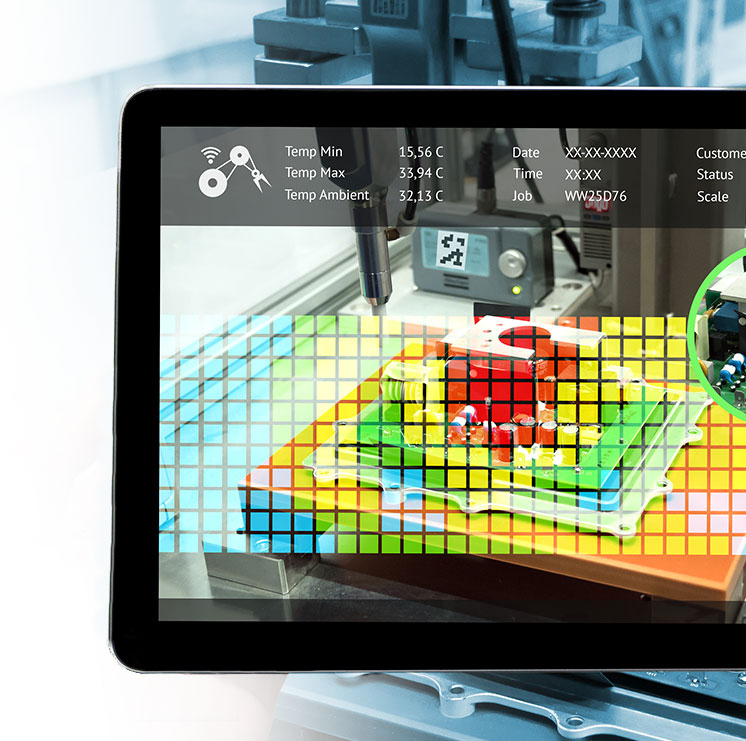DIGITALE DATEN VON A WIE AUTOMATISIERUNG BIS
Z FÜR DIGITALER ZWILLING
Digitale Daten eines Produktes aus dem Engineering, Daten aus der Fertigung und auch verteilter Systeme zu sammeln und zu analysieren ist wichtiger denn je. Die Daten bringen Aufschluss für künftige Vorgehensweisen in Instandhaltung und Wartung und beschreiben den gesamten Produktentstehungsprozess. Man spricht auch von Machine Learning.
In Kombination mit unseren Lösungen für CAD, PLM, IoT, MES und AR/VR sind Sie gut für künftige Herausforderungen gerüstet und können Innovationen für Ihre Produkte, Prozesse und Mitarbeiter vorantreiben. Kommen Sie mit uns auf die digitale Reise!
Digital Engineering
Innovationen und Weiterentwicklungen sind durch ein immer höheres Maß an notwendiger Zusammenarbeit geprägt. Dabei müssen nicht nur die unterschiedlichen Bereiche der Entwicklung – nämlich Mechanik, Elektrik/Steuerung und Software – intensiv Informationen austauschen. Auch mit den Bereichen Vertrieb, Montage, Dokumentation und Aftersales/Services müssen die detaillierten Anforderungen an das Produkt bzw. den Entstehungsprozess abgestimmt und festgelegt werden. Die Vielzahl der Informationen, die heute meist in unterschiedlichen Dokumenten vorliegen, müssen synchron gehalten werden. Auch muss es möglich sein, einfach und strukturiert auf sie zuzugreifen.
Dazu bieten wir ein umfassendes Portfolio an SW-Werkzeug-Bausteinen für ein kombiniertes Konzept aus Model Based Systems Engineering, erweitert um Product Line Engineering, dem Product Lifecycle Management, dem Application Lifecycle Management, dem Software Engineering und der durchgängigen Gestaltung von CAD in die Prozesskette des Unternehmens.


Digital Manufacturing & Operations
Kostensenkung, Qualitäts- und Effizienzsteigerung im Produktionsprozess sind maßgeblich eine Frage der Information. Hochintegrierte Informationsverarbeitung, bedarfsgerechte Aufbereitung von Produktionsdaten sowie eine intelligente Prozesssteuerung stehen für unsere Lösungsangebote in diesem Bereich. Dies reicht von der Datenerfassung und Visualisierung über die Ablaufsteuerung von Anlagen (SCADA), die Statistische Prozessregelung (SPC), die Planung und Steuerung von Aufträgen und die Optimierung der Inbound Logistik für ein ganzes Unternehmen bis hin zu Operational Effectiveness (OEE) und Energiemanagement.
Unser Lösungsportfolio beinhaltet Standard Softwarekomponenten, die die notwendige Funktionalität von der Konfiguration und Inbetriebnahme, der Administration, dem operativen Betrieb bis hin zur statistischen Auswertung qualitätsrelevanter Informationen im Betrieb und einem sicheren Servicezugang abdecken. Somit ist das Gesamtsystem schnell zu konzipieren, angepasst zu implementieren, schnell individuell auf eine Produktionslinie zu konfigurieren und effizient zu betreiben.
Digital Service
Der Service bietet neben dem Ersatzteilgeschäft auch ein steigendes Potenzial für zusätzliche Dienstleistungen und Software Produkte. Aktuell wird der Ruf nach neu zu definierenden Geschäftsmodellen im Service immer lauter, um sowohl für die Kunden als auch für das eigene Unternehmen neue Wertbeiträge zu generieren. Die dazu nötige Funktionalität der IT/OT erhöht gleichzeitig die Komplexität.
Wir bieten Hilfe bei technischen Konzepten und realisieren Lösungen, um die notwendigen Funktionalitäten bereit zu stellen. Dazu gehören beispielsweise sichere Servicezugänge, Predictive Maintenance, Tracking und Tracing von Assets, Machine Learning und Augmented Reality.


Industrial Cyber Security
Den Kundennutzen auch bei sich ändernden Randbedingungen zu erfüllen bzw. zu steigern und die Effizienz weiterhin zu optimieren stehen nach wie vor im Fokus der Produktion. Daher wird es immer wichtiger, Daten aus dem Shopfloor zu nutzen und relevante Informationen durch übergreifende Vernetzung über Anlagen, Fertigungsbereiche, Fabriken und Unternehmen hinweg zu generieren. Der zuverlässige und dauerhaft sichere Betrieb von weltweit vernetzten Maschinen und Anlagen wird dadurch eine elementare Herausforderung.
Wir helfen Ihnen die grundlegenden Handlungsempfehlungen und Mindestanforderungen für Schutzmaßnahmen umzusetzen, wie sie im „Leitfaden Industrie 4.0 Security“ beschrieben sind. Diese bilden einen gewissen Grundschutz für Maschinen und Anlagen. Dabei wird eine entsprechende Produktfunktion zugeordnet, sodass bei der Entwicklung lediglich die für den jeweiligen Einsatzfall relevanten Schutzmaßnahmen identifiziert und umgesetzt werden müssen. Diese Schutzmaßnahmen können dabei sowohl organisatorischer als auch technischer Natur sein. Die Fokussierung auf die relevanten Schutzmaßnahmen bedeutet einen hohen Sicherheitsgewinn für Unternehmen bei überschaubarem Aufwand.

